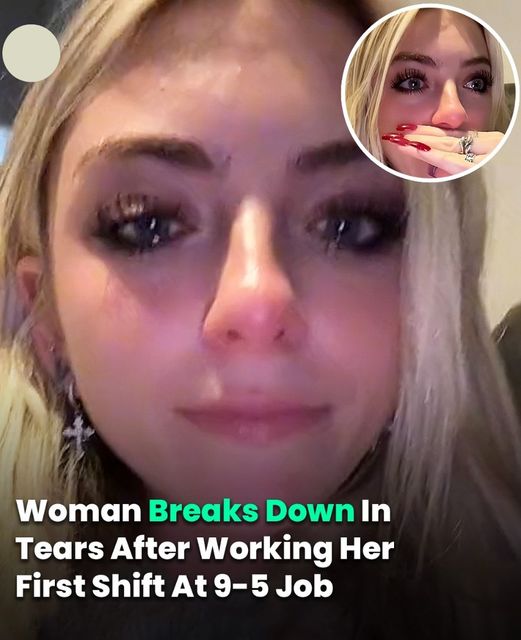Starting a new job, especially your first full-time position after college, can be an incredibly emotional experience. For one young woman, Brielle, her first day at a 9-5 job proved to be more overwhelming than she anticipated. Brielle, who shares her experiences on TikTok under the handle @brielleybelly123, posted a video that quickly went viral, capturing her tearful reaction after working her first shift. The video ignited a widespread conversation on social media about the challenges and expectations of modern work life, particularly for the younger generation.
Brielle’s video, which now has millions of views, begins with her visibly emotional, expressing her frustration and fear about the demands of a traditional 9-5 job. The overlay text in her video poignantly reads: “QOTD in a 9-5 how do you have time for your life,” capturing the core of her distress. She further elaborates in the caption, stating, “I’m also getting sick, leave me alone. I’m emotional, OK, I feel 12 and I’m scared of not having time to live.”
Her candid expression of anxiety and exhaustion resonated with many viewers, particularly those who have recently transitioned from student life to the workforce. Brielle’s concerns revolve not just around the job itself but the lifestyle that accompanies a typical 40-hour workweek. She shares how the commute, coupled with the long hours, leaves her with barely any time for herself. “I get on the train at 7:30 and don’t get home until 6:15 [at the] earliest,” she laments, highlighting how the time-consuming commute only adds to her stress.
The response to Brielle’s video was swift and polarized. Many empathized with her, expressing their own disillusionment with the traditional work structure. One user commented, “The 40-hour work week is beyond outdated and your feelings are totally valid,” while another wrote, “You’re not alone. It’s insane how legit your entire day is gone. This is why we need 4-day work weeks.” These comments underscore a growing sentiment among younger workers that the existing work paradigm is not sustainable and that change is necessary.
However, not all responses were sympathetic. Some users were less forgiving, offering a more traditional perspective on Brielle’s plight. Comments like “Aww, welcome to adulthood” and “I guess I was brought up in a different generation. That is life,” reflect a divide between older and younger generations regarding expectations and attitudes toward work.
In the video, Brielle also expresses her frustration with the necessity of commuting, particularly in a world where remote work is increasingly viable. She notes that if her job were remote, she would have more time and energy to devote to her personal life. This point further fueled discussions about the benefits of remote work and the potential for companies to adopt more flexible work arrangements.
Following the viral spread of her video, Brielle spoke to The Independent, where she elaborated on her views. She emphasized the need for societal change, particularly in how work-life balance is approached. “I want to be able to talk for this next generation and explain that a 40-hour work week plus commute is not necessary for productivity,” she explained. Brielle advocates for a reevaluation of work expectations, suggesting that more companies should consider shorter workweeks, a concept that has already been implemented in some countries with positive results.
The story took another turn when Brielle revealed in a later update that she had been laid off from her job. In another emotional video, she shared her distress over the situation, saying, “Feels like the world is ending, I need a job immediately. I am feeling so lost right now, like I moved for this…?!” Her sudden job loss only deepened her frustration and sense of disillusionment, a feeling that many young professionals can relate to in an increasingly unstable job market.
Despite these setbacks, Brielle’s story has a somewhat hopeful conclusion. She has since found a new job, as she shared in another update, proving her resilience and determination to move forward despite the challenges she faced. Her experience has opened up an important dialogue about the pressures of modern work life, especially for those just starting their careers.
Brielle’s story is a reflection of a broader conversation happening globally about the sustainability of traditional work models. As more young workers enter the workforce, their expectations and demands for a better work-life balance are becoming increasingly vocal. The debate around the 40-hour workweek, remote work, and the overall structure of employment is likely to continue, driven by voices like Brielle’s, who are unafraid to challenge the status quo.
Her journey, from the tearful breakdown to finding new employment, underscores the resilience of the younger generation and their willingness to fight for a work environment that respects their time and well-being. While her initial reaction may have been one of despair, it has sparked a conversation that could lead to meaningful changes in how we view and structure work in the future.

